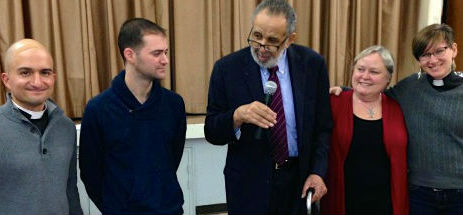The equal rights journey for Hillsdale UMC’s Lisa Schoelles started last summer while the same journey for Rev. Gil Caldwell began more than 50 years ago. Those journeys intersected at the church’s first Finding Joy in Justice event in January.
Schoelles was inspired to do more for equal rights after marching in the NAACP’s Journey for Justice last year. Equal rights have been part of Caldwell’s life mission, which dates back to walking on the bridge at Selma with Rev. Dr. Martin Luther King in 1965.
Schoelles recently became Hillsdale UMC’s Public Theology Advocate, a title that got the attention of Caldwell. Part of the Hillsdale event included viewing the film Selma, which portrayed characters that Caldwell, a retired UMC pastor who lives in Asbury Park, knew personally. The evening also included a discussion with representatives from other churches in the Hillsdale area as well.
“My belief is that we too often think of theology only as individualistic and not public,” Caldwell said. “I had seen the film Selma more than once. It reminds us of a racial history that we have yet to acknowledge, accept and use to transform the present and the future.”
Schoelles said the Journey for Justice March transformed her mind into trying to do something more.
“Journey For Justice was all about reclaiming our voting rights, reforming the educational and criminal systems and working for economic and mental justice,” she said. “That got me really charged up. There is so much institutional racism that we are unaware of.”
Caldwell, now 82, has spent most of his life making people aware of those injustices. On his mind more recently is voting.
“The Congress and the Supreme Court have whittled away provisions of the voting rights act as though there is no longer a need for them,” Caldwell said. “Despite the denials, there are some persons today who are not pleased with voting, like the election of our first black president.”
The location of the Hillsdale event was also not lost on Caldwell. Not that it was a United Methodist Church, but that the church is located in Bergen County.
“Bergen County is one of the most affluent counties in the state,” he said. “It has the opportunity to acknowledge and respond to the economic inequalities of these moments. The task of the church at large is to challenge inequalities, wherever they may be found.”
One of the main points Schoelles took away from the event was that fighting for justice is not only a racial issue, but something everyone needs to take a role in.
“We need to not be silent when there are injustices,” she said. “We all have to take a stand. It’s not a black and white issue, or a Democrat or Republican issue. There are prejudices across the board that need to be dealt with. We need to live our faith and stand up for people who cannot stand up for themselves.”
While Caldwell has spent decades as a champion for equal rights, he hopes that those in attendance at the Hillsdale event and those who attend other events to discuss racial issues, spend time examining their own racial history as well.
“I believe that conversations about race are about more than race,” he said. “They allow us to reflect on where our racial attitudes come from, how those attitudes shape our actions and how we must, for the good of us all, be challenged and find ways to transform some of those attitudes

